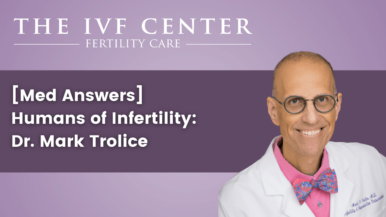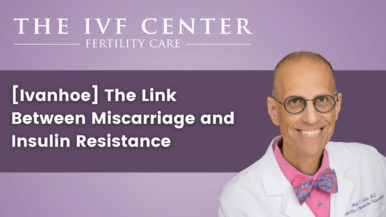Today, family building is radically different than a generation ago. Increasingly, women are putting off childbearing for non-medical reasons, e.g. pursuing a career, lack of a stable relationship, and financial considerations. As a result, over the past forty years, the age of a woman’s first pregnancy has been gradually rising.
A key question: by when do individuals or couples need to decide whether or not to have children? And at what age?
Below, I’ll discuss the ideal timelines for both men and women to plan and start a family as well as address some commonly asked questions about female and male fertility in general.
The Low-Down on Fertility
 Let’s first review some basic female and male fertility facts. Women are born with their total endowment of eggs, roughly 1-2 million, with a subsequent slow and steady loss throughout their reproductive lives; however, exciting research may refute this long held belief. Men, on the other hand, begin to make sperm following puberty and continue making sperm.
Let’s first review some basic female and male fertility facts. Women are born with their total endowment of eggs, roughly 1-2 million, with a subsequent slow and steady loss throughout their reproductive lives; however, exciting research may refute this long held belief. Men, on the other hand, begin to make sperm following puberty and continue making sperm.
A woman’s peak fertility is up to age 30 with a slow but steady decline after that. Untile age 30, a woman’s monthly natural pregnancy rate is about 20%, declining thereafter to roughly 10% by age 35 then to around 5% at age 40. By the way, men are not spared this biological clock. Multiple studies have now shown a man’s sperm production and quality declines with age and male fertility appears to wane after the age of 40 – 45.
When Is the Best Time for a Woman to Freeze Her Eggs if She Is Not Ready to Have Children?
The best time for a woman to freeze her eggs is under the age of 30. The number of mature eggs frozen allows for the best prediction of ultimate pregnancy. For example, with ten frozen eggs the chance of a live-birth is twice as high for women under age 35 and under than for those over the age of 35.
What Should Men Do to Preserve Their Fertility?
Due to their ability to continuously produce sperm throughout their lives, there are less apparent guidelines for men on non-cancer/non-medical fertility preservation, but I believe under the age of 40 is a reasonable time..
Advice for Women Who Are on the Fence About Becoming Mothers? How Do They Make a Decision?
This is an extremely difficult question and one that requires consultation with an infertility specialist as well as a reproductive health counselor. The pursuit of fertility is a physical, emotional, and financial investment with all three of these factors carrying equal weight and importance.
Is There an Optimal Age for Men or Women Trying to Conceive?
 As mentioned above, the ideal time for a woman to freeze her eggs is below the age of 30. The quality and quantity of eggs are far superior to what they will be after a woman turns 40 or even 35. Freezing one’s eggs while under the age of 30 will offer the best chance of conception as the probability of a live-birth is twice as high for eggs from women age 35 and under than for those over 35-years old.
As mentioned above, the ideal time for a woman to freeze her eggs is below the age of 30. The quality and quantity of eggs are far superior to what they will be after a woman turns 40 or even 35. Freezing one’s eggs while under the age of 30 will offer the best chance of conception as the probability of a live-birth is twice as high for eggs from women age 35 and under than for those over 35-years old.
The same holds true for men. Even though they can technically produce sperm throughout their lives, in my clinical practice and experience, trying to conceive under the age of 40 is also the ideal timeframe for a man.
If Someone Is Uncertain About Entering Parenthood, Should They Go Ahead Anyway Because Timing Is of the Essence?
While advances in technology today allow for immediate and effective fertility preservation for men and women, I feel adamant advising my patients never to pursue a pregnancy until they are physically, emotionally, financially prepared, and in a stable relationship, if applicable.
As an infertility specialist for twenty years and infertility patient for ten years, I have endured the struggle of this disease from both sides. My pinnacle of enlightenment came from adopting our five angels. Throughout the process, we learned that infertility patients do not experience an “oops pregnancy;” rather, their child is “chosen.” When one is faced with the devastation of infertility, a myriad of emotions flood your mind including the question “Am I prepared and meant to be a parent?” The moment one faces this crisis, the process of parental responsibility begins, and, hopefully, never ends.
Throughout the infertility and, subsequent, adoption process, my wife and I questioned our readiness and competency to be parents on numerous occasions. We endured the adoption agency’s required home visit, psychological counseling, baby CPR course, then, most importantly, emerged with the comforting knowledge our children would not arrive from an “oops pregnancy” but from being “chosen” by willing open-armed parents.
The “aha” moment of readiness to be a parent results from focused introspection, honesty, and a profound open-hearted discussions with your partner (if applicable).
Taking Control of Your Fertility
Infertility rates among American women have not changed over the years but are dramatically reduced as women age. Both maternal and paternal age continues to be the dominant factor where fertility is concerned. Other factors impacting infertility include:
- Sexually transmitted infections
- Tobacco use
- Obesity
Studies have demonstrated the earlier a woman sees a fertility specialist (board-certified in both Reproductive Endocrinology and Infertility), the shorter the time to pregnancy. Websites and resources to learn about specialists and treatment options include:
- The American Society for Reproductive Medicine (ASRM)
- Society for Assisted Reproductive Technology
- Reproductive Facts
Advice for Physicians
Physicians should counsel both their male and female patients appropriately regarding the biological clock as well as provide accurate evidence to educate them about optimal times to conceive. It is well established the more intercourse PRIOR to ovulation, the higher the chances for conception. We advise couples to have relations every day to every other day over the six days before ovulation by using an ovulation predictor kit (OPK).
The approximate natural monthly pregnancy rates by age are as follows:
| Age | Pregnancy Rate |
|---|---|
| <=30 | 20% |
| 35 | 10% |
| 40 | 5%> |
Following evaluation of ovulation, fallopian tubes, and sperm, treatment options should be based on the reason for impaired fertility, if known. In general, as a woman ages, the aggressiveness of treatment should increase. Fertility treatment options include intrauterine insemination (IUI) and in-vitro fertilization (IVF), both combined with fertility medication.






